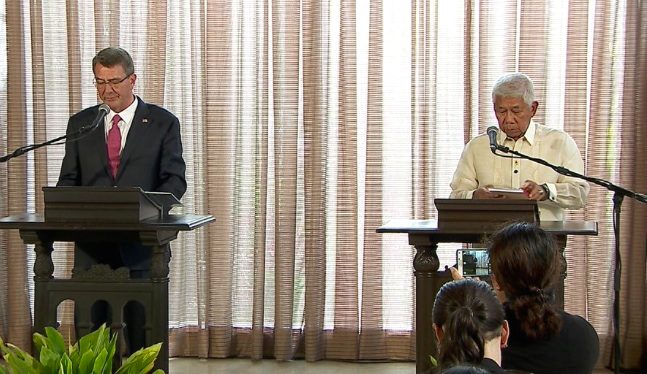SUMMARY
This is AI generated summarization, which may have errors. For context, always refer to the full article.

MANILA, Philippines (UPDATED) – On the same day the group claimed responsibility for the April 9 clash in Basilan that killed at least 19 soldiers, Defense Secretary Voltaire Gazmin maintained on Thursday, April 13, that there is “no formalized” Islamic State (ISIS, ISIL or Da’esch) organization in the Philippines.
Gazmin made the statement in a joint press conference with US Defense Secretary Ashton Carter at the Premier Guest House in Malacañang. Both defense chiefs were asked if their governments had verified the ISIS claim, if this meant there was an ISIS base in the Philippines, and its impact on regional security.
“The [Abu Sayyaf] group in Basilan is trying to organize and be affiliated with ISIS but our information says that there is no ISIS [here] or formalized organization here in the Philippines,” Gazmin said.
Carter did not directly respond to the question but cited “instances” in other countries where extremist groups have sough to “rebrand” themselves through affiliation with ISIS.
“Let me add to that not from a local perspective but around the world, you do see the phenomenon in several places, of groups that formerly existed and were conducting terrorist operations who affiliate with or rebrand in association with ISIL. So we see that in other places as well,” he said.
“It is a worldwide phenomenon of others associating themselves with ISIL and that may be what we’re seeing here by groups in the Philippines. If so, that will be consistent with the pattern you see around the world, and just another reason why it’s important to defeat ISIL which we will do,” Carter added.
Rappler reported that the Basilan incident was the first major attack of ISIS in the Philippines. Rohan Gunaratna, head of Singapore’s International Centre for Political Violence & Terrorism Research, told Rappler. “The group responsible is the Islamic State, led by Isnilon Hapilon in the Philippines,”
The Philippine military has consistently denied ISIS’ presence here despite our previous reports on it. Military spokesmen have stressed the “difference between ISIS-directed and ISIS-inspired.”
It’s a distinction that many consider moot in the age of ISIS and lone wolf attacks, especially since the Filipino groups are following the steps outlined in ISIS manuals and publications, and their videos are shared by ISIS propaganda outlets, wrote Rappler Executive Editor Maria Ressa. (READ: ISIS’ global ambitions and plans for Southeast Asia)
Experts have said the same.
“Given the attack in Paris, the attacks in San Bernardino, the growth of Boko Haram, the growing strength of the Abu Sayyaf in Sulu and Basilan, the upcoming elections and the failure of the BBL (Bangsamoro Basic Law), I think people need to lean towards being alarmist and not complacent,” said Justin Richmond, a former US army special operations operative who later worked on stabilization projects for USAID and other international aid groups, in an earlier interview with Rappler.
‘Nothing but propaganda’
Military spokesman Brigadier General Restituto Padilla rejected the ISIS claim it had killed scores of soldiers.
“This is nothing but propaganda which we would encourage everyone not to pay attention to,” he told Agence France-Presse (AFP), and downplayed public pledges of allegiance to ISIS by Abu Sayyaf and other Muslim rebel groups in the south.
Padilla said clashes with Abu Sayyaf, a homegrown extremist group known for kidnappings and bombings, were on-going in Basilan.
The death toll of soldiers remained at 18 but the number of Abu Sayyaf killed had risen to 31, Padilla said, adding that no military trucks had been destroyed.
Among those killed were a Moroccan bomb expert called Mohammad Khattab, who the military said had been sent to build ties between local Muslim rebel groups and an international jihadist network.
Marc Singer, director of risk consultancy group Pacific Strategies and Assessments, said he was sceptical that ISIS had a foothold in the Philippines but warned that many Filipino groups wanted to emulate them.
“There is a genuine fascination among poor Filipinos in the Muslim south who lack education… their sole understanding of Islam today is from the Internet and what they hear (on the news) and this may drive them to more nefarious acts,” he told AFP.
Based in the southern islands of Basilan and Jolo, Abu Sayyaf has been blamed for the country’s worst terror attacks, including a 2004 Manila Bay ferry bombing that claimed 116 lives.
Carter and Balikatan
In his opening statement at the joint news briefing, the US official conveyed Washington’s condolences to the families of the soldiers killed in the Basilan encounter.
“I’d like to my express condolences, on behalf of the United States States, for the combat losses suffered last week. Our thoughts and prayers go out to the families and to the Philippine Armed Forces, and to the entire nation,” he said.
Carter is in the country to observe the annual joint military exercises between the Philippines and the US – the first US defense official to do so since both governments started holding the annual war games.
His visit also coincides with the implementation of a new military agreement between the two countries, the Enhanced Defense Cooperation Agreement (EDCA). – with reports from Agence France-Presse/Rappler.com
Add a comment
How does this make you feel?
There are no comments yet. Add your comment to start the conversation.